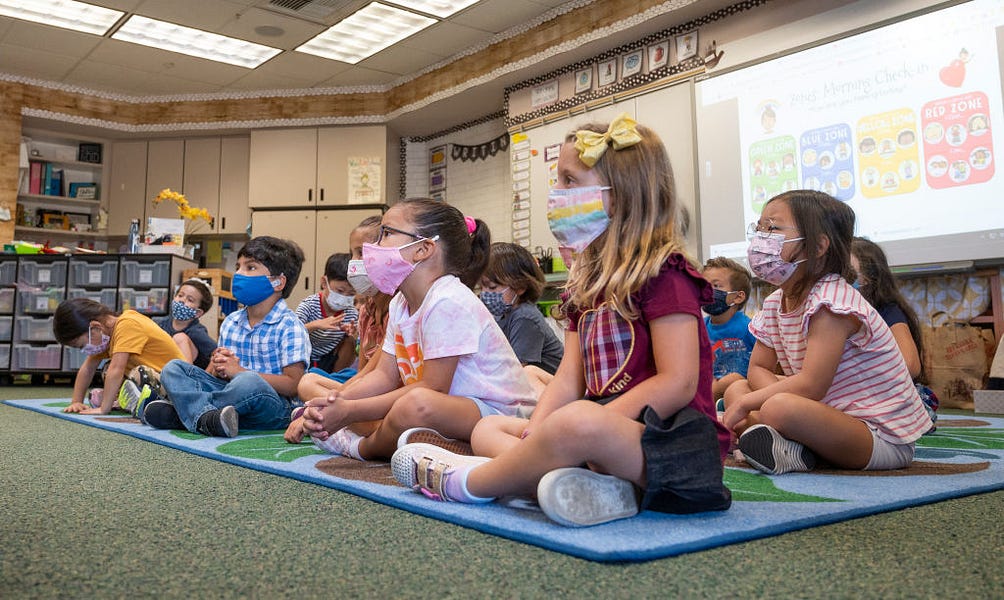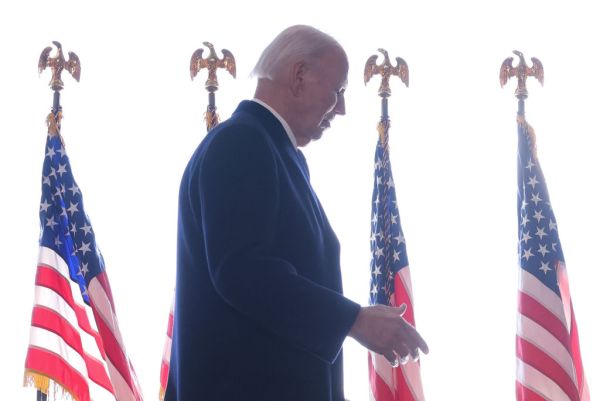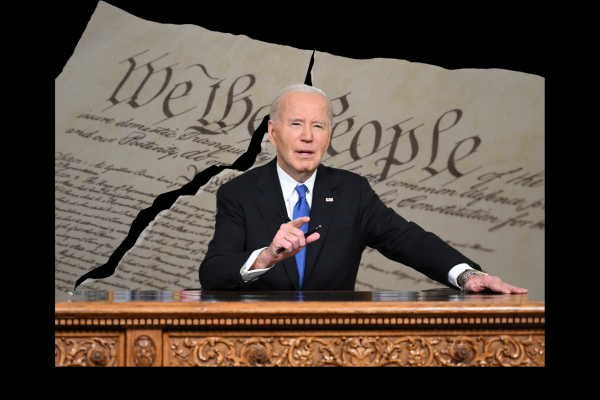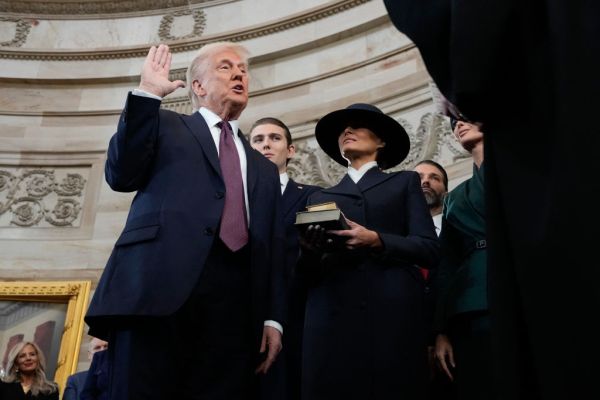On Monday, the Department of Education’s Office of Civil Rights (OCR), apparently following President Biden’s exhortation that his administration would use “all available tools” to crack down on state-level mask mandate restrictions, notified Tennessee, Utah, South Carolina, Oklahoma, and Iowa that OCR is investigating whether such prohibitions implicate federal civil rights laws by preventing local school districts from “considering or meeting the needs of students with disabilities.” The states being investigated could, theoretically, risk a chunk of their federal education funding if violations are found. While there is clearly a degree (likely a large degree) of political posturing animating OCR’s decision to wade into this culture war issue, the investigations raise legal issues that have implications well beyond the merits of this particular dispute. However you feel about masks in schools, this dispute and the interpretation of civil rights laws by the OCR are worth paying attention to.
What civil rights are at stake in the mandatory masking debate?
For many people, the term “civil rights” is inextricably linked to the movements to achieve racial equality. But that is just one of the bundle of “civil rights” that the law protects. There are also laws to protect individuals with disabilities from discrimination in accessibility, employment, and education, among other spheres. Although most Americans think of the Americans with Disabilities Act (ADA), passed in the early 1990s, as the primary law protecting the disabled from discrimination, Section 504 of the Rehabilitation Act of 1973 had already prohibited recipients of federal funds from denying individuals with disabilities an equal opportunity to participate in programs that are funded to any degree with federal money. And so it is Section 504 of the Rehabilitation Act, along with Title II of the ADA (which extended Section 504’s protections to all activities of state and local governments, whether federally funded or not) that are invoked by OCR as the source of its authority to investigate state-level prohibitions on local school board mask mandates.
What do state level bans on mandatory masks have to do with the rights of the disabled?
OCR’s logic here is a bit convoluted, but boils down to the following syllogism: (a) some children with underlying medical conditions are at higher risk of suffering severe consequences of COVID; (b) some subset of these children qualify as having a disability under Section 504 of the Rehabilitation Act and the ADA; (c) federal disability law requires that disabled children receive a free and appropriate public education, and that the education be provided in the regular educational environment to the maximum extent appropriate given their needs; (d) state-level mask mandate prohibitions might prevent local school boards from adopting mask mandates that could allow certain high-risk disabled children to attend regular in-person classes where such children might not be able to attend such classes without a mask mandate.
Thus, the legal question will be whether state-level entities banning mask mandates are preventing local school districts from “considering or meeting the needs of students with disabilities,” as required by law.
What are the problems with OCR’s approach?
There are several. First of all, in general terms, most legal disability protections focus on the individual disabled student and the services, modifications, and accommodations that might be made for him or her. For example, a given student with a disability might be provided an aide to assist during school, have certain testing requirements waived or modified, or be otherwise accommodated by the school (easy example: a service dog might be allowed). Here, OCR’s complaint is different—that state requirements are preventing the local adoption of a baseline rule regarding masking that, OCR speculated, might allow certain disabled students to attend in-person schools. Thus, in OCR’s view, a school district might want to impose a mask requirement on every student as an accommodation or modification for the disabled students, and be unable to do so because of a state anti-mask mandate.
But any state-imposed baseline rule will always favor some group at the expense of others. For example, school schedules, the length of class periods, the number of days per week in school and the number of days of attendance required for the year might all be state-imposed rules that prohibit potential alternative local rules that certain classes of disabled students might prefer. For example, deaf students who read lips, or autistic students who might have a hard time reading social cues even without masking, might prefer a mandatory no-mask policy, and mandatory masking might make in-person schooling untenable for them. It immediately becomes clear why changing broad or statewide rules for everyone as a means of serving a particular set of disabled students is impossible to do without creating conflicting claims by others. This is the opposite of the traditional approach of having a process (such as the individualized education plan process many parents of children with learning disabilities are familiar with under the Individuals with Disabilities Education Act) by which each student is evaluated to determine whether his or her situation or experience can be modified to allow maximum participation, rather than the rest of the class being subject to modifications to accommodate an individual.
The second problem with the OCR approach is more fundamental: It uses federal civil rights law to override a state educational decision using what is essentially a “disparate impact” basis. This technique could convert virtually any state or local decision into a federal one. Of course, when dealing with intentional discrimination, the anti-democratic nature of civil rights laws are the point: It doesn’t matter whether a local school board wants black students to attend a public school or not, they have a right to. Similarly, a school cannot deny a reasonable modification of an existing rule or policy to disabled students whether or not that idea is popular.
But once the federal government begins to broaden its focus to neutral laws that might have a “disparate impact” on a protected class, there is virtually no limit to possibilities of federal second-guessing. The other side of the masking issue is a great example—mandatory masks, just like bans on mandatory masks, might benefit some students and burden others, but that is exactly the balancing that states and localities must do. Were the Trump administration still in office, a state mask requirement in Virginia or Massachusetts could just as easily be subject to a Trump OCR “investigation” premised on the allegation that jurisdictions with low transmission of COVID and thus at low risk were prevented from adopting no mask rules that would maximize the ability of autistic children or lip readers to attend schools on an integrated basis. In my view, this hypothetical Trump OCR investigation, like the current Biden OCR investigation, would not be well-founded because it would use disability law as the pretext to force change in a local political decision the federal government doesn’t agree with.
The final, related problem with the Biden OCR investigation is that because it is clearly a pretext to allow the Biden administration to take a side in mask mandate culture wars, it erodes public trust in OCR and in disability protections generally. Though the chances of any state losing federal money based on this investigation are slim, OCR’s eagerness to jump into the fray at all is exactly the kind of politicized law enforcement both parties claim to dislike and that President Biden campaigned on eliminating. He is entitled to use the bully pulpit of the presidency, and though I’m skeptical of mandates, I’m humble enough to acknowledge that either side may be “right” as matter of science. So let Biden and DeSantis, as well as the other anti-mask Republican governors, have it out over masks heading into 2022. Just leave civil rights and disability rights laws out of it.
Bob Driscoll is chair of the white collar and government investigations Group at McGlinchey in Washington, D.C., and a former deputy assistant attorney general for civil rights with the Department of Justice.







Please note that we at The Dispatch hold ourselves, our work, and our commenters to a higher standard than other places on the internet. We welcome comments that foster genuine debate or discussion—including comments critical of us or our work—but responses that include ad hominem attacks on fellow Dispatch members or are intended to stoke fear and anger may be moderated.
With your membership, you only have the ability to comment on The Morning Dispatch articles. Consider upgrading to join the conversation everywhere.